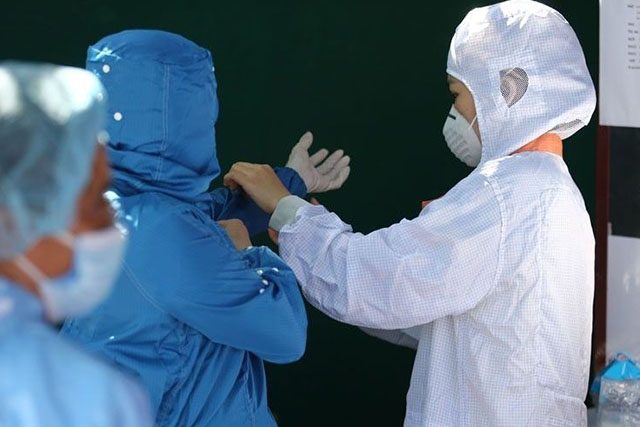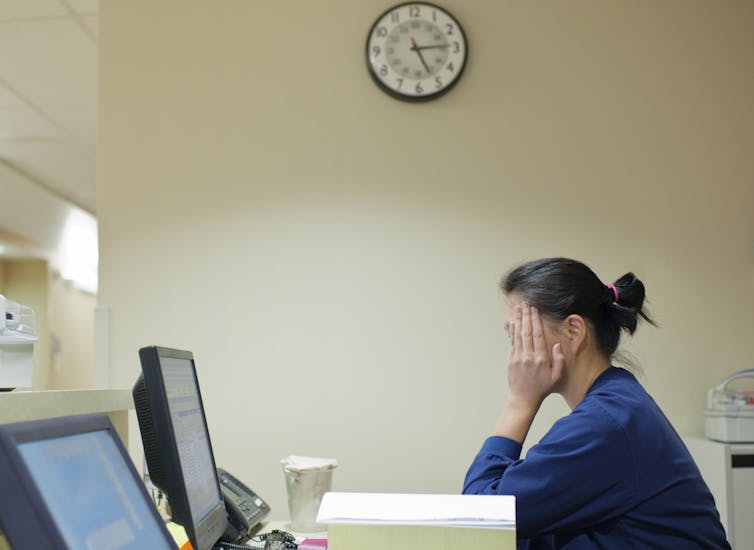

Helen King/The Image Bank/Getty Images
Karen J. Foli, Purdue University
Throughout the COVID-19 pandemic, nurses have been given unprecedented media attention for their daily, selfless sacrifices. Make no mistake: COVID-19 patients recover largely because of the nursing services they receive. Yet, hidden within the layers of care rendered by nurses are the psychological traumas they endure.
Now, as nurses are hailed as health care heroes during the pandemic, we’re faced with what to do about these psychological injuries, not only for the 4 million nurses in the U.S. – the largest health care workforce in America – but for the rest of us who depend on them.
For the past five years, I’ve examined the types of psychological trauma that nurses experience. Along with Dr. John Thompson, my co-author, I’ve described them in our 2019 book, prophetic as it was published six months before COVID-19 first appeared in China.
Prior to the pandemic, nurses faced ethical and personal safety dilemmas during disasters and other emergencies. They saw patients suffer, not only from illness itself, but because of health care interventions, otherwise known as medically induced trauma (think of a patient on a ventilator).
In a follow up study after the book was published, I dug deeper, collected information from nurses, and learned of yet another type of psychological injury: insufficient resource trauma. This occurs when nurses don’t have the staff, supplies, knowledge or access to other professionals to fulfill ethical or professional responsibilities. The pandemic has been a dark catalyst to seeing this urgent concern. In a survey of 32,000 nurses just completed by the American Nurses Association, 68% of nurses said they are worried about being short-staffed and 87% are very or somewhat afraid to go to work.
Demands for resources largely ignored for decades
A particularly big part of insufficient resource trauma comes from inadequate nurse staffing levels, which may lead to bad outcomes for both nurses and patients. The evidence for these outcomes, both compelling and consistent worldwide, is based on more than two decades of research. Having to forego what you know is right when there’s just not enough staffing in a high-stakes environment feels like a betrayal of one’s spirit. A nurse’s sense of morality, of what is right and wrong, is endangered.

Dean Mitchell/Getty Images
More recently, there has been a shortage of PPE (personal protective equipment) throughout U.S. hospitals. But I know nurses who were told by employers to take care of COVID-19 patients regardless of whether or not adequate PPE was available. Clearly this was a danger to both nurses and patients; surely this qualifies as a traumatizing experience.
Other nurses – some new, some working previously in non-acute care – have been deployed to critical care units. Understanding the technology of these complex environments requires a steep learning curve. The knowledge, then, to competently care for these patients may be considered an insufficient resource.
The toll on patients and nurses
Nurses, more than anything, strive to deliver high-quality care and connect with patients during their most vulnerable times. But often there isn’t the time. The inability to achieve that goal causes stress. Imagine being forced to choose between giving morning meds and sitting down with a patient newly diagnosed with cancer – or spending time with the family of a patient with COVID-19. Choices like that leave nurses focused on tasks and morally injured.
In my pre-pandemic study, traumatized nurses report symptoms of PTSD (post-traumatic stress disorder): intrusive thoughts, sleep disturbances, hypervigilance, “brain fog” and flashbacks. They felt unsafe, isolated and dissatisfied with the profession. As nurses, they felt like failures. One former bedside nurse quit, opting instead for office work, where her “level of trauma and stress is virtually nonexistent.”

Getty Images/Education Images
Some traumas may be unavoidable. That happens when the nurse fully engages with the patient and co-experiences suffering. This is called secondary or vicarious trauma. That’s why we need to offer trauma-informed care to both nurse and patient. Meaningful connections with others is critical, but so is psychological safety.
The pandemic has focused our attention on the mental health needs of health care providers. Nursing organizations have responded, and these efforts are to be applauded. But until we appreciate the sovereignty of nurses, who practice in a way no other health provider does, solutions to avoid trauma will be stalled. And nurses will continue to struggle.
Compassion helps to heal
While I haven’t been at the bedside for a number of years, I still remember how it felt to report to the acute care center at the hospital, hoping no one had called in sick. When that happened, I was assigned an extra patient or two. I knew I couldn’t give the care I wanted to the paraplegic young man. I knew I couldn’t spend more time communicating with the older adult who had a sudden right-sided stroke. I couldn’t give them the things so important to healing – the physical care, the nursing presence and the compassion they needed and deserved.
Those experiences stay with you. It’s a heck of a feeling.
Nursing care is both an art and a science; it is a distinct profession that wields enormous influence on those who need the most help. They do not merely follow instructions from other providers. It’s a beautiful profession, unlike any other, founded on intellect, judgment and a caring spirit. It pushes a person to examine values such as social justice and the ethics of life, and it becomes a part of who a nurse is.
Until all of us see nursing this way – and until organizations provide sufficient resources to prevent avoidable trauma, which will allow nurses to provide safe, quality care – nurses will continue to suffer. More will choose to leave the profession. Particularly now, that’s a loss society can’t afford.
[You need to understand the coronavirus pandemic, and we can help. Read The Conversation’s newsletter.]![]()
Karen J. Foli, Associate Professor, School of Nursing, Purdue University. This article is republished from The Conversation under a Creative Commons license. Read the original article.









